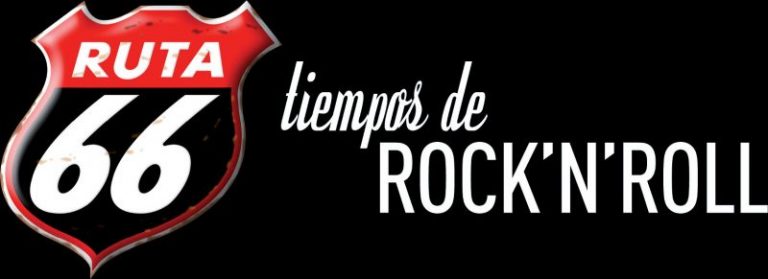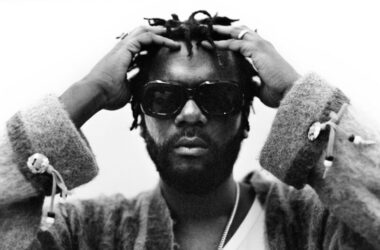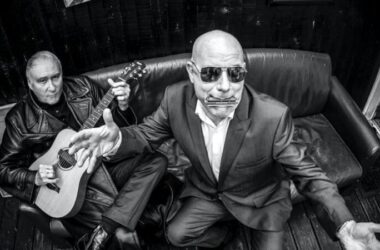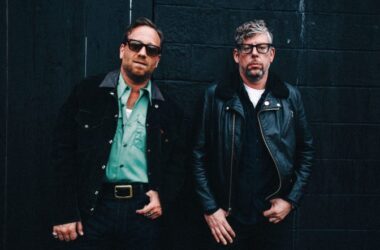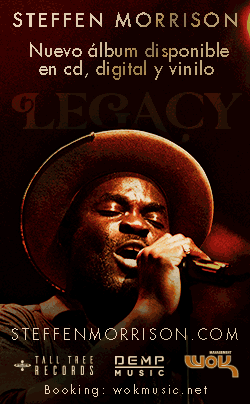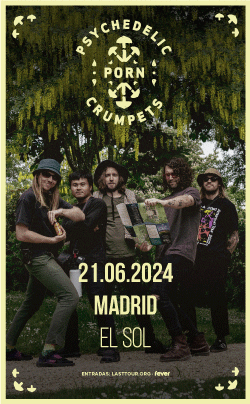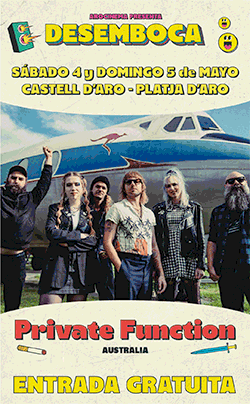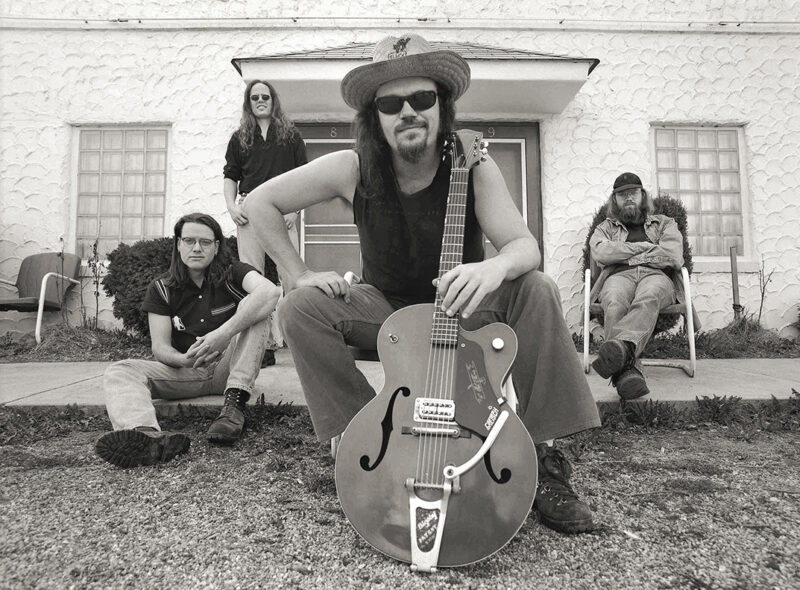
Este mes de septiembre publicamos en la versión papel un extenso artículo a modo de tributo a The Bottle Rockets tras el anuncio de su separación definitiva. El artículo es un trabajo de largo recorrido llevado a cabo por nuestro compañero Jordi Pujol Nadal que ha conseguido contactar con los protagonistas y personas cercanas para elaborar un completísimo ejercicio periodístico a modo de biografía oral. Muchos de los entrevistados nos han pedido que deseaban poder leerlo y por ello, lo publicamos en su versión extendida en inglés.
March 21, 2021 was a bad day. When the news hit that Brian Henneman was retiring from the Bottle Rockets, many long-time fans went on an emotional roller coaster, from anger to sadness, from feelings of loss to utter disbelief. The well-loved band from Festus, Missouri, would no longer exist as we knew it. Half a year later, we’re still grieving, but it’s time to move on and pay tribute to their legacy.
Over the course of 28 years, the Bottle Rockets assembled an impressive body of work that few can boast of. They merged rock ‘n’ roll and honky tonk with a singer-songwriter approach when terms like alternative country or Americana had yet to be coined. They teamed up with the Del-Lords’ Eric Ambel. They had a radio hit. They appeared on the Conan show. They fought. They honored the music of Doug Sham. They went into the studio with Warren Haynes. They faced line-up changes. They recorded a live album in Germany. They resurfaced with three masterpieces in a row. They backed Marshall Crenshaw. And they kept delivering killer shows night after night.
We asked Mark Ortmann (drummer) and John Horton (guitar) to look back and share their memories with us. We also spoke to some of their usual conspirators and musical peers. What follows is an oral story of a hard-working band who always stayed true to their music and who succeeded in marvelously capturing real people’s ups and downs.
Eric Ambel: I had been producing records for a label called East Side Digital that was based in Minneapolis. I produced the Blood Oranges, Go To Blazes and other roots rock bands for them. The head of the company, Steve Daly, was a real “music guy”. One of the best music guys I’ve worked with to this day. He told me that he had a band with a great singer/writer called The Bottle Rockets. His plan was to have them go to Athens, GA to record their first album in a sort of documentary way with producer/engineer John Keane and then to have them work with me on their next record.
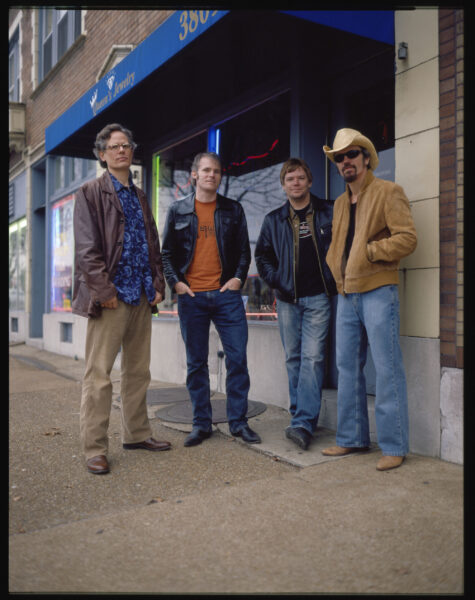
John Keane: I met Brian when I was working on The Uncle Tupelo record. They had planned to record for three or four days, but got caught in a snow storm on the way to Georgia and had to sit in a parking lot for a couple of days. They called me from the road and said they were coming anyway and would record everything in one day, which they did. When they arrived they were exhausted, but they forged on. They set up and kept the first or second take of each song. They were very well rehearsed and things went smoothly. It has a live, spontaneous feel to it, which I really love. Great songwriting. I think it has stood the test of time very well.
Patterson Hood: We were all starting out about the same time so I’m not sure about influence. We probably shared a lot of the same influences, Mike and I’s previous band Adam’s House Cat actually played a show with Uncle Tupelo when they were first starting out.
Mark Ortmann: Uncle Tupelo and The Bottle Rockets came from the same music scene in Saint Louis, but I always recognized a difference in our music influences. Uncle Tupelo was a mix of punk and old-time hill music (Minutemen, Stooges, Roy Acuff, Flatt & Scruggs) whereas the Bottle Rockets were a mix of classic rock and honky-tonk/outlaw country (Neil Young, Lynyrd Skynyrd, Buck Owens, Merle Haggard, Waylon Jennings). I know that’s an over-simplification, but John Horton has best described our band as equal parts Neil Young, Cheap Trick, and John Prine. We like guitar rock with pop sensibilities and a singer-songwriter turn-of-phrase or sense of humor. I’ve always thought that Brian’s song writing style is similar to Roger Miller.
Peter Blackstock: At their peak, they weren’t really very far behind the level that Uncle Tupelo reached, I think. The talent level in Uncle Tupelo really was off the charts, as became clear when both frontmen ended up in highly respected, long-lasting bands. The Bottle Rockets’ art was really all about Brian as frontman, though he always had good people behind him. A secret weapon was his co-writer Scott Taylor, who was never in the band but was really important to their identity.
Scott Taylor: I taught at the high school Mark attended. He took drum lessons from our music teacher, Dick McCreay, and Dick had told me Mark had promise. Plus, I knew Mark (I had coached him on the freshman basketball team and had him in class) and knew he would be easy to work with. Mark always had a strong work ethic. Dick McCreary and Brian and myself urged Mark to study Charlie Watts’ style of playing, which he did, and that is roughly the type of drummer he became.
Mark Ortmann: Actually, most of the lyrics to those early albums were not written by Scott, but he indeed wrote lyrics to some fan favorites from that period: «Kerosene», «Welfare Music», «Gravity Fails», «Queen Of The World», among others. He has been an important contributor and influencer with the band from the beginning, and remained so throughout our career. Scott always encouraged and took interest in song writing during all phases of the band. We first met when he taught English at a local high school that many past-and-present band members attended (I was a student in the first class he taught). He had an extensive record collection and was a tremendous music resource who would introduce us to “obscure” artists by loaning us albums. It was Scott that turned us onto Doug Sahm. At one point I was a drummer without a band and Brian was in a band without a drummer. Brian and I were suspicious of each other because we were often in competing bands with different interests, but Scott knew both of us and suggested we get together to test our chemistry. That simple jam session unexpectedly turned into a decades-long musical partnership. Who knew it would lead to that!
Scott Taylor: At first I was just someone who helped organize practices. They were teens and I was in my early 20s. I sort of made them focus and learn songs each time they practiced. I had no idea what I was doing. I didn’t know anything about music in a formal sense. I didn’t know what chords were for instance. I just really loved music and had a big record collection and loved being around people playing music. Brian and Scott Summers and Bob Parr were part of the first band, The Blue Moons, and they began writing songs as soon as they started to play instruments. I borrowed a guitar and Brian showed me a couple of chords and I immediately wrote a simple little song. Our natural impulse was to create new songs. Over the years I wrote for the band in several ways: sometimes it was a whole song, sometimes it was handing lyrics to Brian and sometimes it was he and I sitting down and writing together. In the later years it was mostly me just giving him lyrics.
Patterson Hood: The first time I ever heard «Kerosene», I thought it was a perfect song and one of the best things I had ever heard. I still feel that way all these years later. They had an abundance of great songs.
Scott Taylor: I think it is the best song I was involved with. There was an actual incident similar to the song. A local family burned up in a trailor because they used gasoline instead of kerosene in a little portable heater. The trailer was towed out and sat for months in a lot off of Highway 61 outside of Festus. I was haunted by it and tried for some weeks to write about it. Then one day I was showering and the first verse and chorus came to me. I wrote most of the lyric dripping wet after bolting out of the shower to write it down before I forgot it. My original music for it was very similar to Bob Parr’s «Rural Route», which was written the same week as Kerosene. So, Brian changed the music. When I hear it now I am very humbled and grateful that Brian turned it into the song and record it became.
Eric Ambel: I went to see the band and realized that these were the guys from Chicken Truck and that I had met Brian long before at a gig and had their demo tape for years. We corresponded before the sessions in Brooklyn with Brian sending me solo ‘boom box tapes’ of the songs. Then we rehearsed the band at Mark Spencer’s loft in the Gowanus neighborhood of Brooklyn before going to the studio. The band had already been touring and was very tight.
Peter Blackstock: They were kind of right-place/right-time. Very good songwriting and a style that drew heavily from roots music but ultimately fell more on the rock side of things than country, which I think was true for the core artists around whom we launched No Depression in 1995. We had a feature story on them in our first issue (which had Son Volt on the cover) in fall 1995. They also shared the cover (with Old 97’s) of our 9th issue (May-June 1997), and were last on our cover for issue #48 (November-December 2003).
Mark Otrmann: I wrote the lyrics to «Sunday Sports» after flipping through television sports shows on a Sunday afternoon while the humor of «Welfare Mothers» by Neil Young was on my mind. The subject matter was intended to be the flip side of that coin and not meant to be taken seriously, but the song developed more muscle in the studio. The chaotic ending wasn’t planned and happened naturally because we would often beef-up song endings in our live shows. Our producer Eric Ambel recognized the brutal beauty as it was happening and he sneaked into the recording room while the tape was rolling and cranked with the knobs on Brian’s effects pedal to add more chaos.
Eric Ambel: We recorded that record at Coyote Studios in Williamsburg, Brooklyn. At the time Williamsburg was not the trendy, expensive neighborhood it is now. Coyote Studios was started by the brothers of the Del-Lords bass player. It has been gone for a long time. There’s an Urban Outfitters store there now. We worked quickly but we weren’t just recording the songs as they had been playing them. We worked hard on the arrangements. I rolled up my sleeves and contributed harmony singing and other instruments. It was thrilling to sort of show the band where they could go with their songs. My attorney at the time, upon hearing the record, told me that I’d be getting producing gigs because of ‘The Brooklyn Side’ twenty years later and that turned out to be very true.
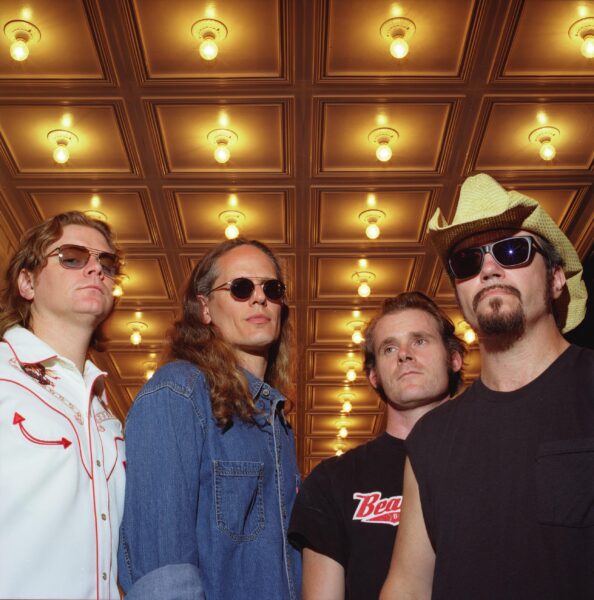
Scott Taylor: We were on our way to an early Bottle Rockets gig up in St. Louis and Tom Ray and I were talking about country music. One of us said the phrase “welfare music” and it really struck me as interesting. I remember writing the lyric in my head the whole night as they played. I got a scrap of paper from a bartender and was writing down ideas. I was happy to take a shot at right wing radio personality Rush Limbaugh. He is the fat man on the radio. To me that part of the song showed my Randy Newman influence. Limbaugh once started to play the song on this radio program and stopped it after that verse and went into a rant. I’m pretty proud of that. He was a terrible human being in my opinion.
Carlene Carter: I do love these guys for having a song with me mentioned next to Loretta Lynn. That blew me away.
Marshall Crenshaw: I heard «Thousand Dollar Car» when it first came out — that song caused a sensation on a certain level, and made me a fan right away.
Peter Blackstock: ‘The Brooklyn Side’ and No Depression’s launch were not the same year, actually. We started in fall 1995; ‘The Brooklyn Side’ came out on East Side Digital in 1995, though it got a wider release in 1995 via Atlantic. It holds up very well, though I don’t know I’d call it their best work. Their self-titled 1993 debut had what I still think is their best song, «Kerosene», and 1997’s ‘24 Hours A Day’ was equally as good, to me. I think all three of those albums together represent the band at its best.
Jeff Powell: They were extremely important to the alternative country movement and would have to be considered one of the founding groups of the whole thing. Americana wouldn’t be what it is today without the influence of the Bottle Rockets. As far as their legacy goes, that’s the great thing about recording music, they have left some amazing records behind as those records will be here long after we are all gone. They definitely left their mark in a most real and beautiful way.
Eric Ambel: ‘24 Hours A Day’ was made for a subsidiary of Atlantic Records. We had more money and more time for recording. We recorded at John Mellencamp guitarist Mike Wanchic’s studio in Bloomington, Indiana. We also got the opportunity to work with a great engineer in Nashville named Richard Dodd when crafting the mixes. It was quite the experience.
Mark Otrmann: Success in the music industry requires some talent and persistence, but involves more luck, timing, and trends than anything else. ‘24 Hours A Day’ was released on Atlantic Records, but the category of Americana Music didn’t have the popularity it currently has and we were difficult to market. Understandably, Atlantic followed the path of least resistance and directed their resources to other artists on their roster that were easier to market with quicker results: Hootie & the Blowfish, Matchbox Twenty, Jewel. There’s a funny story that illustrates how out-of-step-with-the-times we were: When G. E. Smith was the music director for Saturday Night Live in the 90s, he pitched us to Lorne Michaels to perform as the music guest on SNL, but Lorne rejected us because he thought we were too ugly for television. However, Chris Stapelton played SNL in 2016 looking no better than we did in 1996. Funny how the times change. Ha!
Scott Taylor: I think they were too rock for most country fans and too country for most rock fans. Atlantic didn’t know what to do with them, but I think they would be a hard band to break commercially any way you look at it. Some people really loved them and got what they were doing, but most people just didn’t. I think they were certainly worthy of a bigger audience than they had, however.
Peter Blackstock: I do think there was a little bit of a fall-off with ‘Brand New Year’, but to be honest I don’t really remember enough in detail to offer much of a sense as to why. By that point, they were off Atlantic and on indie label Doolittle, and the “moment” of having major-breakthrough traction probably was gone.
Eric Ambel: After ‘24 Hours A Day’ the band signed with a new record company called Dolittle. The head of that label was a guy who had been to a famous music school studying to be a producer. After he got out of the school he wasn’t really able to land the producing gigs he wanted. He tried opening his own studio and offering free time to those who would let him produce, but even that didn’t work so great for him. Eventually the guy wrote a proposal and landed an investor to bankroll him and the founding of his label Dolittle. He signed a bunch of very good roots rock bands from around the country and paired them with very good producers and engineers, but in the end he would take control out of the hands of the bands, engineers and producers to finish the records himself with his instructor from the famous music school. The Bottle Rockets were the only band that he signed that made it through the difficult experience to continue as a band after all of their time on the label. It was a very destructive relationship. The Bottle Rockets did not let him take total control of the record ‘Brand New Year’, but he did force us to go to Memphis and re-mix the record at great cost with the engineer of his choosing and he also made us use the mastering guy of his choosing. The band didn’t really have a manager at this time and the entire experience put me in a really bad place between the band and the label guy. In the end I basically “fell on the sword” and took the blame for the label guy’s malfeasance so the band could continue. When the label imploded the band moved on to Bloodshot Records and worked with other producers.
Mark Ortmann: Our album ‘Brand New Year’ is indeed darker and louder because it was written/recorded after our disappointing experience with Atlantic Records, then involved a protracted fight with Doolittle Records over mixing the album. We were angry at the time and the album reflects that, but there are still songs from it that became standards in our live shows: «Love Like A Truck», «Nancy Sinatra», «Alone In Bad Company», «Sometimes Found».
Robert Kearn: In 1997 I was in a band called Cry Of Love and after two albums on Columbia Records our band was coming to an end. We had a manager named Mike Renault and he also managed The Bottle Rockets. It just so happened at the same time Cry Of Love was ending The Bottle Rockets were in need of a bass player. I drove to St. Louis to try out for the band and I guess it went well because I stayed with them for the next eight years. The recording of ‘Brand New Year’ was a lot of fun. We recorded it in Springfield, MO. with Eric “Roscoe” Amble. I really liked that album because it’s one of the more rock and roll records we made in my time with the band.
Edgar Heckmann: Well, I am aware of the Bottle Rockets since their debut album from 1993. I am addicted to Country Rock, Alternative Country — whatever you call it — since the early 70s, when I bought the first album of the Eagles. The connection to the Bottle Rockets was obvious and I became a huge fan of the band. At my first trip to the SXSW festival in Austin, Texas in 1995 I saw the band live for the first time and I was trying to sign them for Blue Rose Records (we didn’t even have a name for the label yet), but they took the chance to sign a major deal with Atlantic, which didn’t last very long. When they signed to Doolittle Records/New West Records I got the rights for Europe of their ‘Brand New Year’ album. In the meantime the band and I became good friends — whenever I was in the USA I tried to catch them, either in Austin or in Nashville.
Robert Kearn: The album had more of a hard rock 70s style arrangement. That style of music is exactly what I grew up on so that first record for me fit in with what I was already accustomed to playing. I haven’t listened back to the album in some time, but every time I do I’m still very pleased with how it turned out. I think it still sounds good today. All of those songs were a lot of fun to play live.
James McMurtry: In the late nineties and early oughts, we kept running into the Bottle Rockets at festivals in the midwest where we were on the same bill. Other than having different state license plates on our vans, our approach to touring was pretty much identical. Later we toured the midwest with them. That was the only time we ever played in Duluth Minnesota. Lake Superior was frozen over.
Mark Ortmann: ‘Songs Of Sahm’ re-set our musical compass and was the therapy we needed after the trauma of making ‘Brand New Year’ and our disillusionment after Atlantic Records. We are super fans of Doug Sahm and wanted to honor his legacy with a tribute album after his death. At first, we thought about inviting our musician friends to participate, but then realized we should just do an entire album by ourselves. The project was completely organic as we chose our favorite songs and played them from memory. There was no stress and it made music enjoyable again, and the album took on a life of its own! Doug’s groovy vibe is good medicine.
Peter Blackstock: I thought it was great, especially coming off of the slight downturn of ‘Brand New Year’. At that point they were due for a curveball of sorts, and the Sahm record was a really nice breath of fresh air in that regard. Sahm’s songs are so good that they really couldn’t go wrong. It’s nice that they played their part in helping to expose Doug’s music to more people.
Robert Kearn: On ‘Songs of Sahm’ we were once again back in Springfield, but this time we produced the album on our own and with Lou Whitney at the control board. Everything about the recording of the album was easy and seemed to flow effortlessly. I remember wanting to have an organ part on one of the songs but we didn’t have a keyboard player so I went upstairs where the B3 was located (they had the wires downstairs to record it), figured out the part and we recored it in no time. I believe we did that on a couple of songs with the organ.
James McMurtry: I guess my fondest memory of The Bottle Rockets was the last time I saw them, at Roots on the River in Bellows Falls, Vermont. I had flown in and done my set solo acoustic. For the finale, I joined the Bottle Rockets on stage and Brian and I traded verses on Doug Sahm’s «She’s About a Mover». I think Doug would’ve got a kick out of that.
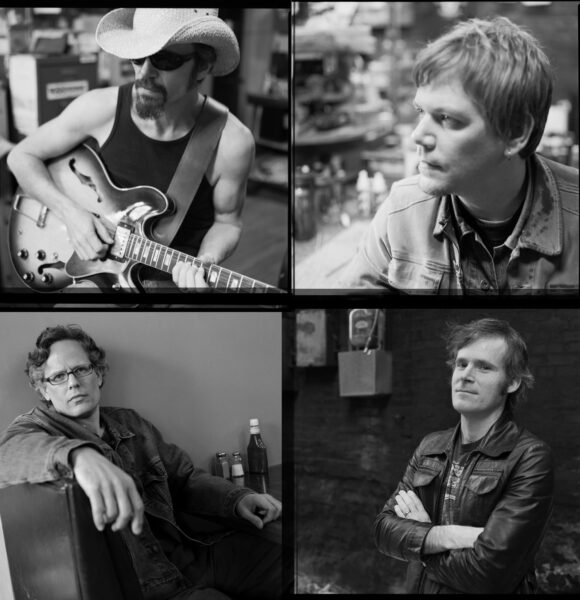
Mark Ortmann: Tom Parr left the band after ‘Songs Of Sahm’ and we didn’t hurry to fill the spot. Brian, Robert, and I decided to remain a three-piece for a while and enjoy the change of scenery. Our manager at the time was Stefani Scamardo who ran Hard Head Management, and who happened to be the wife of Warren Haynes. However, Warren was a fan of our band from years earlier when his brother owned a record shop in Asheville, North Carolina, and I think may have even given us the recommendation to Stefani when we were shopping for a manager. So, when we were ready to record our next album, Warren offered to produce it with his collaborator Michael Barbiero. We loved the idea and jumped at the offer. Come on! How can you say no to Warren?! He is one of the most laid-back, enjoyable, humble, knowledgeable, and talented musicians I’ve had the pleasure to work with.
He is truly salt-of-the-earth, and that’s my highest form of praise! Plus, Michael was a package deal! Warren is best known in the jam-band world, and Michael has an impressive career spanning from disco remixes in the 70s, to engineering/producing major acts across the past four decades. Surrounded by those sorts of influences, it would have been understandable that we make a big rock record, but we unexpectedly drifted towards a less rocking approach for ‘Blue Sky’. I don’t remember us ever intentionally choosing or discussing that direction, it just happened to be where the sessions went, but Warren understood our headspace and was totally supportive. The album indeed has a different personality than our usual catalog, but does include many live show standards: «Lucky Break», «Baggage Claim», «Blue Sky», «Cartoon Wisdom», and Brian’s most heartbreaking and tender song «Mom & Dad».
But the album didn’t have much of a life because the label Sanctuary Records was bought and merged not long after the release of ‘Blue Sky’ and evaporated into whatever conglomerate currently owns that entity. Ugh! However, I have pleasant memories of those recording sessions, and especially enjoyed when Warren would get very stoned, eat empanadas, and share his tales of adventure with The Allman Brothers, David Allen Coe, or Gov’t Mule. And Michael would chain smoke Brian’s cigarettes while telling his experiences working with James Brown, Guns N’ Roses, Lennon/Yoko, Metallica, etc. And not only were those amazing experiences a blast, but there was a neighborhood pizzeria near the studio that made an enormous 24 inch pizza! What?! Brian and I had to witness a two-foot diameter pizza, so we ordered one and ate off the carcass for a few meals.
Robert Kearn: On ‘Blue Sky’ we found ourselves recording in New Jersey. Warren has a fantastic ear and he would only make suggestions as far as arrangements. He played an incredible slide solo on another song I co-wrote with my friends Phil and Mike Gardner called «I Don’t Wanna Go Back». It was a real honor to work with Warren and also Michael Barbiero, who is a legend in his own right.
Scott Taylor: I’m not a very good judge of such things since I am pretty close to a lot of that material. I really like that album. It is a change of pace album. It sort of stands outside of most of their work. Personally, I think it is a very strong record.
Edgar Heckmann: Since I had started Blue Rose Records I was trying and helping to bring label artists to Europe and booking a show in my hometown Heilbronn so when a European tour was planned in 2005 I told the booking agent to give me a show. The tour was happening in the middle of summer and it was damn hot on that Sunday July 17th. Although it was holiday season in Germany the room at the Buergerhaus in Boeckingen (a suburb of Heilbronn) was packed and the audience was eager to see the band live for the first time in Germany. Since there wasn’t any live album available yet of the band I asked them if it would be possible to make a professional recording of the show. When the band got the recording and listened to it they couldn’t believe what they heard and gave their okay to release it. The only problem was that the band was signed to Bloodshot Records worldwide but since the guys of the band and I had more than just a business relationship I got the okay from Bloodshot to release it on Blue Rose. We decided to make a 2 CD/2 LP set of the complete show. The sound is fantastic, the guy who did the recording, mastering and mixing (Andy Horn) did a great job – I think it’s one of the best live recordings I have ever heard.
John Horton: Lots of memories of that show! A really great German meal (first time I ever had white Asparagus), that defied my stereotyped impression of German food: heavy and meat and potatoes. Although traditional dishes, it was very fresh and plenty of greens and cooked vegetables. I’m fairly certain it was the first time I met Edgar Heckmann, whom you may or may not know, he runs Blue Rose Records, who were our label in Europe. An odd venue that was really deep underground in an old cellar, down a long set of stairs with at least one landing. When touring, I always tried to walk a bit around the venue wherever that may have been. When heading out for a stroll around the venue in Heilbronn, I was given a warning about “Tunisians” which I thought really odd, because by my American standards, the neighborhood around the venue was really very quite nice, and wasn’t going to present any dangers. I mean, have you ever experienced a rough neighborhood in an American city? That’s existential danger. The show was paked and was really quite a sweaty affair. This show was towards the end of the tour, and you can’t really hear it in the recording of that show, but we were kind exhausted. That being said, we were absolutely firing on all cylinders and in top playing shape.
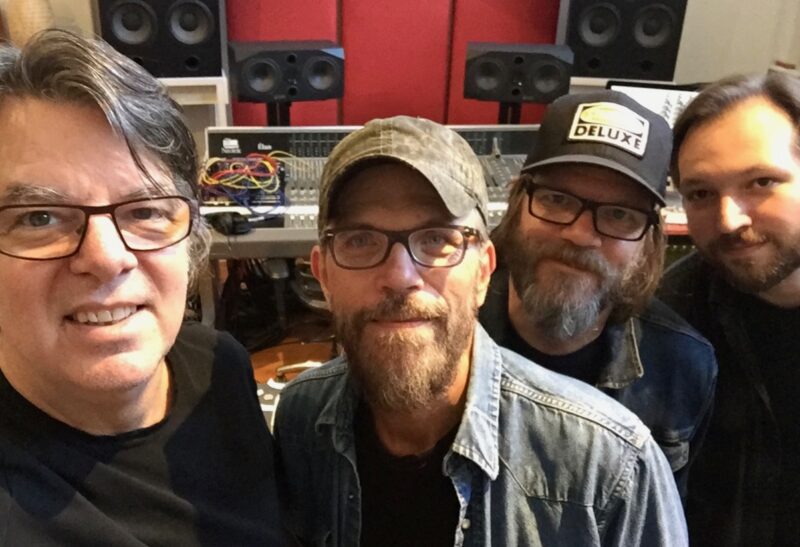
Edgar Heckmann: I have great memories of that show in Heilbronn. Carrying the heavy gear downstairs to the venue (comparable to the Cavern club in Liverpool) was hard, an elevator would have been helpful. Since it was very hot that day everyone was sweating even before the show had started. July 17 is the birthday of the band’s mastermind Brian Henneman so when I made the introduction I asked the audience to surprise him with the “Happy Birthday” song. I knew that they won’t understand any word I am saying so they were laughing out loud when the crowd suddenly started singing “Happy Birthday to you”! You can hear it on the album!
Jeff Powell: The way I ended up working with them was that we had common friends. Shilah Morrow, who was and is a dear friend to this day, was working with the Bottle Rockets at TAG Records and had sent me their CDs to see if I liked the records, because she was really excited about this band. I listened and I really did like them a lot. The Cds end up in my car, and then I’m listening to them all the time in in my car, my wife Susan ends up checking it out too, and loves the records and then we were fans.
It was a cold, rainy Memphis autumn night, and Shilah had let me know that the Bottle Rockets were playing at Barrister’s, an old alley way dive bar in downtown Memphis, that night, and put me on the guest list. Blue Mountain was opening for them! Shilah called me from New York City about an hour before the show and made sure I was going. Susan was on the road, it was nasty and chilly outside, and I told Shilah I was going to stay in and that I would catch them next time.
She wasn’t having it. She yelled at me to get my ass off the couch and go downtown and see this show. So I did. Blue Mountain was great and when the Bottle Rockets started playing, they just blew me away! It was a night I’ll never forget. So from that night on, I let Shilah know that I wanted to make a record with this band, and to please let them know.
As far as the fondest memory from working with them on the Zoysia record, there were too many to count, but one of the themes of the whole session is that Brian had brought along a copy of Neil Young’s ‘Tonight’s The Night’, and declared at the beginning of the session that if we ever got stuck on an idea during the session, to just look at the back cover of the album and ask yourself, “What would those guys do?” And that’s what we did….
John Horton: Recording with Jeff at Ardent, is one of the things from my tenure with Bottle Rockets I will always cherish. That was really special, and I won’t ever forget it. What a legendary place,both the studio and the city, and Jeff is really kind of an aspect of that studio legend. Memphis is so steeped in the music made in Memphis, that you can’t escape being influenced by it, when you are there. Definitely there is the odd nod to “Memphis” here and there on the record. We definitely felt steeped in the place when we were there, we knew the music from the studio and the city, so the connections were easy to feel when recording. I’d say overall the recording experience turned out good, although the experience with the album left something to be desired. I think what we didn’t realize at the time, was that essentially the band was starting over with ‘Zoysia’.
Jeff Powell: I went to a rehearsal at Brian’s house in St. Louis and we ran through a bunch of songs a month or so before we actually went into the studio, so we dug in and got to work right away. John and Keith were both on point and even in Brian’s basement, they sounded like a band. As a matter of fact they sounded exactly like The Bottle Rockets! They were all a blast to work with and everyone was free to share their ideas.
Scott Taylor: Preachy political songs don’t work for me, but it was a time when certain feelings and anxieties had to be expressed or it wouldn’t have been honest. The song «Zoysia» was about how in the real world people could have different opinions politically and still get along in their regular day to day lives. Unfortunately, I don’t know if I could write that lyric today. America has become much more partisian. It’s very sad. Indeed, heartbreaking.
Jeff Powell: I definitely think that it holds up today. It was nearing the end of the George W. Bush administration, and Obama was on the horizon with the “Yes We Can” mantra just around the corner. «Zoysia» is one of my favorite songs on the album, because it’s basically singing about the Golden Rule, “Do unto others as you would have them do unto you”. What a beautiful world it would be if we all acted like that. I also love «Where I Come From». It really tugs at my heart strings and I remember on final playback after we mixed it, it brought tears to my eyes. «Happy Anniversary» is also very special and tells a great story. I don’t think there is a bad song on the record, but «Zoysia» is probably my favorite.
Eric Ambel: I was very happy to get the call I had hoped for to come back and work with the Bottle Rockets again. The new guys, guitarist John Horton and bass player/harmony singer Keith Voegele, were very good. We recorded and mixed at Cowboy Technical Services (my Brooklyn studio partnered with engineer Tim Hatfield). We again returned to really working together on the arrangements to craft unique recordings of the songs. I was very happy to be working with the Bottle Rockets again as they have always been one of my all-time favorite bands.
John Horton: It’s always a pleasure to work Eric Ambel. Mark and Brian had worked with him before, but this was a totally new experience for Keith and I. ‘Lean Forward’ was interesting to record, in that Eric’s personal studio is always set up where the desk is in the middle of the room, and it’s as live a recording as is possible. I had never recorded like that, this was my first experience with a setup like that. I would agree that ‘Lean Forward’ ranks high in our recorded output, but…
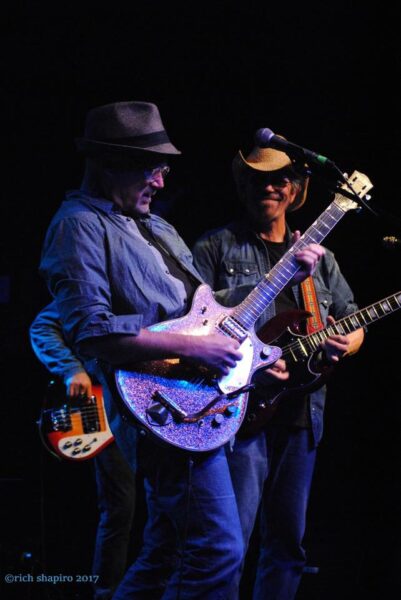
Marshall Crenshaw: ‘Lean Forward’ was their latest album when I came into the picture, and I’d say it’s one of the best rock albums of that decade. Songs like «The Kid Next Door», «Get On the Bus», and «The Long Way» — who writes better stuff than that? Those songs have depth and insight, along with being great rock and roll. It’s actually their later stuff that I’m really familiar with, and I never got tired of listening to their sets before I went on.
James McMurtry: ‘Lean Forward’ is my favorite. They were greased up from the road and then they reunited with Eric Ambel as producer. Brian and John had evolved a guitar weave that hadn’t existed for them before. Keith and Mark were locked in tight. They had everything working at that moment.
Eric Ambel: To me the records and the way we approached making them have always been determined by the songs. After determining which songs would make the best story the songs get crafted to form an “album” that you’d want to listen to and experience from start to finish. For ‘South Broadway Athletic Club’ we changed our working procedure and location. In Brooklyn I had begun working with Mario Viele, a St. Louis native who had moved to NYC, and he helped me find the right studio to record in St. Louis as the band wanted to work near their home. We found Sawhorse Recording in South St. Louis to be great for recording The Bottle Rockets. We used a new approach for the band of working on one song per day from the tracking through the overdubs and all of us found it to be very creative. Our attention would be totally focused on each individual song until it was done. Each song had it’s own feel as opposed to doing the rhythm tracks first in a batch and then coming back later for vocals or overdubs. After the recording was completed in St. Louis, Mario and I brought the tracks back to Brooklyn to mix at Cowboy Technical Services with Brian and Keith in attendance.
John Horton: I think ‘South Broadway Athletic Club’ is a better overall record than ‘Lean Forward’. I think it’s a little more cohesive song to song, by this time having done ‘Lean Forward’ we had all worked with Eric and so it was a little easier to dial in sounds and talk about “solutions” to performances and parts to songs. I have lots of good feelings about this record! Yeah, I suppose it is kind of grown up rock and roll, and that’s a good thing. The dog video, if memory serves, was a collaboration with Bloodshot. I honestly can’t remember who came up with idea of our musical peers and friends appearing in it, but that felt really good, and it’s such a fundamental song about something so relatable.
Carlene Carter: I can’t truly remember why Sparky and I ended up in the video other than Brian asked me. I believe he had seen or I had shown him Sparky singing and howling when I sing. Sparky was really the talent required for that particular video.
John Horton: It might be «Shape Of A Wheel». Hands down, one of the best songs Brian ever wrote. The lyrics are about the band, but are also applicable to just about any road somebody may be on. It’s just one of those instances where the lyrics and music are just so perfectly matched, and I’m really proud to have been a part in recording it.
James McMurtry: Brian is a killer lyricist and spot on as a singer. He finds the detail that most of us miss, and he never shies away from a note.
Jeff Powell: Personally I related to Brian’s songs immediately because I too grew up in a really small town in Missouri, about 70 miles away from Festus, Mo. where the Bottle Rockets started. His songs really touch my heart and punch me in the gut, sometimes at the same time. That’s not easy to do, and it is one of Brian’s greatest strengths.
Robert Kearn: Brian Henneman in my opinion is one of the most underrated songwriters in America. I’ve always admired the way he can paint a picture in your mind with his lyrics and get right to the point in a very succinct manner.
Scott Taylor: Brian was the main songwriter and the central creative force of the band. He could or would only do songs that he could relate to and could sing honestly. I, for instance, always aimed my songs or lyrics at a character that I thought Brian could get behind. I know that Mark also understood this. Mark was co-writer of several great Bottle Rockets songs, but he always knew Brian would edit or change things about his contributions. I knew this as well. Bob Parr’s songs were usually unchanged from the demos that Bob would do. Bob is an amazing songwriter who has an artistic voice all his own. And Brian was a great interpreter of those songs.
Eric Ambel: Everyone was happy about this approach after ‘South Broadway Athletic Club’, so ‘Bit Logic’ was done in a similar manner with the new songs dictating the overall direction. With ‘Bit Logic’ the band wanted to be a little more “country”, meaning their version of “country”, and they also wanted to have more dynamics and not be blasting all the time, so that informed our approach for ‘Bit Logic’. I have to also say that re-uniting with Richard Dodd (Tom Petty/Willburys) who had transitioned from mix engineer to elite mastering engineer (Tom Petty/Willburys/The Mavericks/Sturgil Simpson) working on finalizing the tracks really helped us realize what we were trying to accomplish sonically.
John Horton: We were consciously trying to channel that music. We were also really making an effort to change our sound, become something that allowed for the lyrics to shine better in a live setting. That was always a challenge to do sometimes with the rock band that we were. Yes, definitely an attempt at something cleaner and tighter sounding for the band.
Mark Ortmann: We intentionally tried to make an Americana/Outlaw album with ‘Bit Logic’. Brian’s aim was for us to record only songs that he could envision Kris Kristofferson singing. That’s a very lofty and ambitious goal, but I hope that maybe we got in the ballpark.
Robert Kearn: I have heard some of the albums recorded since I left the band and what I’ve heard I really like. I actually pre ordered ‘Bit Logic’ through the website before it was released. I’m pretty sure it’d be impossible for the Bottle Rockets to release an album that I didn’t like.
James McMurtry: I don’t know what their legacy will be for music as a whole, but they certainly left their mark on me. When we toured with The Bottle Rockets, we improved, because we had to. Those guys never left their attitude back stage, they brought it right up front every night, no matter where. To avoid getting a stern lecture from my bass player at the end of the night, I will always try to remember The Bottle Rockets and their attitude before I take the stage.
Robert Kearn: I have so many fond memories of my time with the band from driving 23 hours to open up for the Allman Brothers in Jones Beach, NY. to performing at the Smithsonian Institute for the premier of the movie ‘River Of Song’ and getting to meet Ann Peebles there, to backing up Fontella Bass in St. Louis and getting to sing harmony with her on «Rescue Me». If I could go back in time I’d change my choice of not living a sober lifestyle like I do today. Those guys put up with a lot of nonsense from me and I was admittedly not at my best during those years. Looking back we had a great time, but I wish I would’ve been a better version of myself and helped contribute more to the songwriting with Brian. I will forever cherish my time with the band and consider myself lucky to have played with each and everyone of the Bottle Rockets. Long Live The Mighty Bottle Rockets!
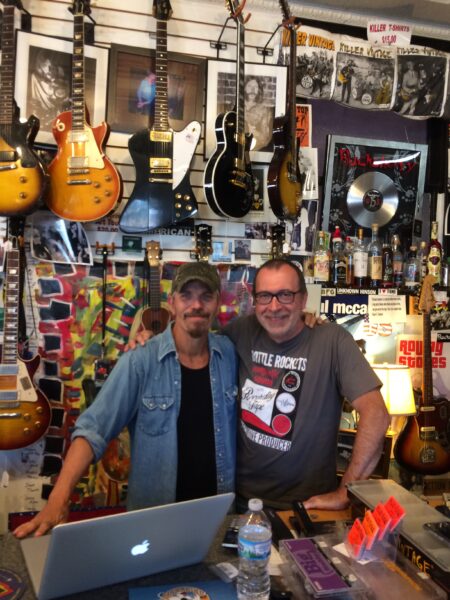
John Horton: There are quite a few, but believe it or not one of them is absolutely our time spent touring in Spain! It wasn’t enough, and each short visit to Barcelona I’ve left a little piece of my heart in the city and country. We had some fantastic shows, and hands down some of the most enthusiastic and engaged audiences. What a fantastic place, and I keep telling my wife that any chance we get to visit Europe again, I want to go back to Spain. It’s so interesting to me how much the landscape of Spain and the whole of the west of the United States resemble each other. It’s easy to overlook in the English speaking Americas the massive connection between the Americas and Spain, but that connection was really driven home to me getting to spend even the small amount of time there. So yeah, getting to know Spain a little bit.
Eric Ambel: There’s a lot of different factors that go into determining “success”. Different tools that are available at the time to promote the band and the recordings. To me it’s really not a competition. Throughout their career the Bottle Rockets created great recordings of compelling songs that meant something to them and their audience. Connecting with a wider audience is dependent on a lot of things that are beyond anyone’s control. To me the band leaves a great legacy of songs, recordings and performances. Nothing they did sounds dated. It all sounds fresh and the things the songs talked about keep coming up and that’s a sign of being able to communicate ideas that are on people’s minds. To me that is success.
Edgar Heckmann: I think the band’s influence on alternative country in the 90s is very important. A lot of bands and artists tried to sound like this band because they love them, but they never came close to the Bottle Rockets. Brian Henneman is a fantastic songwriter and when you hear a song of the band on the radio or wherever you know it’s the Bottle Rockets because nobody sounds like the Bottle Rockets! I’m sure their legacy will stay forever as one the most important bands of this music genre.
Carlene Carter: I have always liked the band, but can’t speak to any kind of progressive changes that have happened musically. I like them as people as much as I like the music.
Patterson Hood: The Bottle Rockets were a hard working rock and roll band with great songs, a killer show and an undeniable work ethic that they carried forward into everything that they did.
Scott Taylor: Their music was raw and honest. They had a sense of humor, and they captured the way real working class people try to navigate this difficult world. They also had tremendous variety in their music and lyrical subject matter. Also, they managed to survive as a band for a long time while at a level of popularity that made it difficult to do. They grinded it out and stayed at it. They sacrificed and worked hard just like working class people do. I think what they leave behind is a great body of work. Hopefully, more people will discover it as the years go by.
Mark Ortmann: I think the song writing of Brian and all the contributing band members stayed somewhat consistent through our career. Almost always the songs were written on acoustic guitar, so they had roots in the singer-songwriter influence. They would then develop direction when presented to the band or producer for rehearsal. Like Tom Petty said, “If a song doesn’t work on acoustic guitar, you better keep an eye on it.”
By Jordi Pujol Nadal

